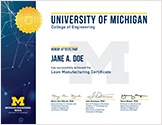SIX SIGMA CERTIFICATIONS
Lean Six Sigma Green Belt - Healthcare
Home » Professional Education » Six Sigma Certifications » Lean Six Sigma Green Belt – Healthcare
Key Information
Course Dates
Time Commitment
Approximately 60 self-paced hoursNot ready to commit?
Subscribe for email updates on future offerings and get a program brochure.
Earn your Green Belt from the University of Michigan. 100% online.
Learn how to effectively solve problems by integrating Lean and Six Sigma within the DMAIC approach. Using case studies and examples primarily drawn from healthcare organizations, this online course will set you up with a structure to systematically frame problems, collect data productively, and implement sustainable solutions.
Healthcare Track
Using examples and case studies, this course focuses on applications primarily drawn from healthcare organizations, including office processes and healthcare operations. Project results include improved patient satisfaction scores, reduction of patient wait time, increased equipment utilization, fewer billing errors, and more.
LEARNING OBJECTIVES
- Understand variability through the graphical representation of data
- Describe a process visually through process mapping techniques
- Apply DMAIC problem solving process toward process improvement at the Green Belt level
- Interpret test results and draw conclusions based on data
- Develop recommendations and control plans to improve processes
- Complete a process improvement project outside of class that demonstrates the application of the full DMAIC methodology
PROGRAM OVERVIEW
The following modules are required, and you will also receive access to optional supplemental material.
Continuous Improvement Overview
- Integrating Lean and Six Sigma, Classic Forms of Waste, Kaizen, Lean-Six Sigma in Healthcare
DMAIC Problem Solving Process
DEFINE: Requirements Flow Down, Linking Customers to Business Performance Metrics (VOC/VOB), Project Charters
- Process Maps: SIPOC, Swimlane, Process Mapping Diagram
MEASURE: Exploring Data Patterns & Distributions (Run Charts, Histograms, Box Plots), Outliers (Supplement: Course Software Tutorial)
- Descriptive Statistics (Sampling, Mean, Median, Variation)
- Measuring Current State Capability (Yield, PPM Defective, DPMO)
- Rolled Yield Analysis (Types of Yield, Rolled Yield, Normalized Yield)
- Process Stability – Overview of Statistical Process Control (Variable and Attribute Control Charts)
- Measurement Systems Analysis (MSA)
- Value Stream Mapping – Part 1 (Current State Map, Value Add Timeline)
- Value Stream Mapping – Part 2 (Value Stream Productivity Analysis, Effective Process Time, Lean Levers: Pitch Interval, Volume/Mix Leveling, and Future State Maps)
ANALYZE: Qualitative Analysis (Affinity, P-Diagram, Cause-Effect Diagram, 5 Whys)
- Stratification Analysis (Grouping Variables, Multiple Box Plots)
- Check Sheets and Pareto Analysis
- Two Group Hypothesis Tests (F-tests, t-tests, 2 proportion tests)
- Two-Variable Analysis: Scatter Plot/Linear Regression/Correlation
- Standardized Work Analysis (Time Observation, Capacity Planning Sheets, Detail Job Instructions, Leadership Standardized Work)
IMPROVE: 5S Process, Standardized Work, Training, Error Proofing, Visual Aids, Process Monitoring
- Flow Improvements (Push vs. Pull Systems, Little’s Law, Batch Size Reduction, Layout Improvement)
- Failure Mode and Effects (FMEA) Analysis
CONTROL: Methods of Control
- Project Selection and Scoping
- Applying the Six Sigma Methodology and Course Summary
Estimated: 60 self-paced hours
- 40 hours (approximately) for lecture recordings and exercises
- 10-30 hours for project work
All requirements must be completed within 180 days after your start date. If you do not complete the course within one year of your start date, you will be required to re-enroll at a reduced cost of $500.
This is a self-paced online course consisting of 24 lecture modules with 22 exercises (multiple choice tests to complete after each learning module). Most lecture tapes are approximately one hour in length. While the course is self-paced, we recommend completing two sessions/week.
Lean Six Sigma DMAIC analysis may be applied to a vast array of process improvement opportunities. Participants are expected to complete a project to practice and apply course concepts.
Participants pursuing their University of Michigan Lean Six Sigma Green Belt Certification are required to:
- Complete all required online lecture modules
- Complete all testing exercises with an overall cumulative score > 80%
- Successfully complete Green Belt Project (reviewed by U-M faculty)
A basic understanding of statistical analysis methods is recommended, including:
- Basic Microsoft Excel Skills
- Basic Statistics
To view technical requirements, click here.
Administrative/Online Technical Support
Support staff are available via phone and email to help with administrative and technical issues during our normal business hours (Monday through Friday 8:00 a.m. to 5:00 p.m. Eastern Time).
Content Questions/Certification Project Support
Candidates are welcome to contact the course instructors for content questions and project support. The instructors will provide support via e-mail, phone consultation, and/or online videoconferencing.
COMPLIMENTARY SOFTWARE
U-M’s Green Belt Certification courses include a copy of QE Tools statistical analysis software.
QE Tools is a user-friendly Excel add-in tool designed for Lean Six Sigma Green Belts. Students will use QE Tools to apply the various problem solving and statistical analysis methods both within the course and for their Lean Six Sigma project.
Six Sigma Content Subscription
Interested in maintaining access to course materials after you earn your certification? Purchase a 1-year Six Sigma Content Subscription and retain access to your Canvas account.
INSTRUCTIONAL TEAM

Pat Hammett, PhD
- Lead Faculty, Six Sigma Programs
- Associate Chair of Masters Education, Integrative Systems + Design
- Lecturer, College of Engineering

Don Lynch, PhD
- Instructor, ME-OPE
- Vice President of Quality, Strategy, and Transformation, SKF USA Inc.
What's Next?
CERTIFICATE
Lean Six Sigma - Black Belt - Transactional/Healthcare
Effective quality analysis requires finding the right tool for the right problem.
CERTIFICATE
Master Black Belt in Operational Excellence
Gain program management and technical problem-solving skills to be an effective continuous improvement leader.



